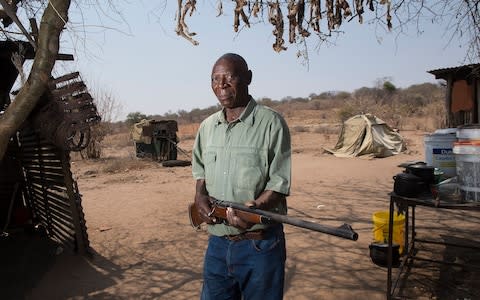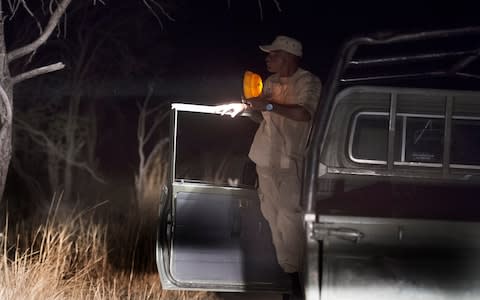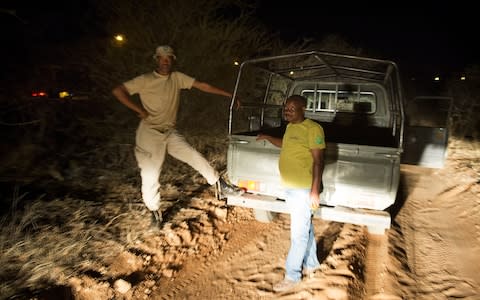Bitter human-elephant conflict undermines Botswana's leading conservation efforts

Nobody saw exactly what happened in the seconds leading up to Cappie Shamakuni's death, but a police report in the days after likened his injuries to that of a lynching.
The 55-year-old self employed handyman had been walking to his home in Kasane, northeastern Botswana, when he met a herd of elephants who had wandered into town seeking food and water. Both of his legs were broken just above the ankle.
His liver was crushed and his ribs broken, indicating he was finally killed by being stamped on. Botswana is home to some 130,000 elephants - more than any other country in Africa - and its success in saving them from the poaching epidemic that has swept other parts of the continent has made it a mecca for wildlife tourism and the toast of environmentalists.
It has even brought Royal endorsement. In 2017, Prince Harry and Meghan Markle visited the country to help collar elephants for Kasane-based charity Elephants Without Borders.
This week, the Duke of Sussex will return to Botswana during a trip to southern Africa with Meghan Markle and their son Archie.

But growing elephant numbers and dwindling resources are creating a bitter interspecies conflict that has claimed dozens of human and elephant lives and is now pitting the government against much of the world’s conservation establishment.
“We can see the impact of climate change in water, rainfall, water scarcity, and because of that fertile land is dying away. Which means humans and wildlife are competing for fertile land for production of food and vegetation,” said Kitso Mokaila, Botswana’s minister of environment.
In May, the government announced it would lift a five year ban on hunting elephants, in a move widely condemned by animal rights activists. The government says it is a necessary response to the stresses of growing populations and a changing climate.
Nowhere is the resulting conflict more visible than in the Chobe enclave, an area of floodplain and forested hills in the north of the country where several thousand subsistence farmers eke out an existence raising cattle and farming maize and sorghum.
The drought sweeping southern Africa has hit this area hard. The landscape around the village of Parakangulu, which on the map is in the centre of a swamp, is one of parched sand, yellowed grass, and a handful of sorry looking palm trees and thorn bushes.

Underfoot, brown cannonballs of elephant dung are strewn everywhere and the trampling and raiding of fields has become so widespread, many farmers say they have not gathered a proper harvest for several years.
"They break your fences, they trample your fields when you plough, they eat your crops before you harvest,” says 70-year-old farmer Edward Temedi, 70. “There are too many, and they need culling.”
Twice, Mr Temedi has been nearly killed by marauding elephants, including one instance in 2017. "I was walking to my aunt's funeral when it came at me. I still don't know why," he says. "I hit it with my axe, she came for me again, so hit her again. Then the axe went flying out of my hand and I was thrown to the ground.”
Goring him through his right hip, the elephant lifted him on its tusks, dropped him to the ground, and set about trying to stamp him into the ground. It was only when his food container rolled out of his pack that he was saved. "I think it thought it was my head, because it turned towards it and savaged it," he said.
Many people here say the time has come for an all-out cull.
And there is anecdotal evidence that the animals can sense the growing threat.
“They don’t like anything that smells of people,” said Kgositkemotse Maera, the leader of the problem animal control unit in the Chobe enclave, a rapid response unit charged with defusing potentially deadly human-elephant encounters. The animals' night raids on boreholes now include the apparently wanton - almost ritualised - vandalising of pumps and generators.
Like peacekeepers in many conflicts, Mr Maera's unit is overstretched and underfunded, with just a single ageing landcruiser to respond to calls that come in, often at night, to their 24-hour nuisance elephant hotline. And the team admit non-lethal solutions are hit and miss.
Electric fences are effective but not foolproof, and for poor communities in remote areas, impractical. Improvised alternatives include hanging strips of corrugated metal on fences to create a noise, fencing fields with beehives, or burning briskets of chilli peppers mixed with elephant dung, which is meant to produce a foul-smelling smoke no elephant can stand.
One farmer has even rigged long canvas ribbons between poles, which make a ghostly whumping sound in the wind meant to scare the animals off. It is a clever device, but no one is yet convinced that it works. Under the plans announced in May, the government will auction licenses for the right to shoot 158 elephants.

The wildlife department in Kasane has already received hundreds of applications for the raffle that allocates licenses to local citizens. Advocates of the scheme, including Mr Mokaila, argue those numbers will have no impact on the overall population, but should restore deterrent “buffer zones” that prevented elephants from expanding their range into populated areas before the hunting ban.
But the policy has plenty of critics - starting with the former president who introduced the ban on hunting in 2015. Ian Khama, a self-styled wildlife champion, was once a close ally of Mr Masisi. But the two have fallen out dramatically over elephants.
When the government finally announced hunting would resume in May, Mr Khama quit the ruling party, and threw his weight behind a new opposition, the Botswana Patriotic Front. The pair will clash for the first time at a general election on October 23. Major conservation groups have also expressed concern.
Tusk, the elephant charity led by the Duke of Cambridge, has warned that lifting the ban would undermine efforts to halt the illegal ivory trade that is responsible for a catastrophic collapse in elephant numbers across Africa since the 2000s. But patience here is rapidly running out.
“I don’t know if it is because with civilisation, people come to consider animals more important than human beings, or that some people are making so much money from the animals,” Dorcus Shamakuni, whose brother was trampled to death in May.
“But if an animal kills a human being, with relatives, with children to look after, it is just ‘oh, he was very unfortunate. What a shame.’ And if a human kills an animal it is some kind of tragedy, it is news all over the word.”

Protect yourself and your family by learning more about Global Health Security

 Yahoo News
Yahoo News 
